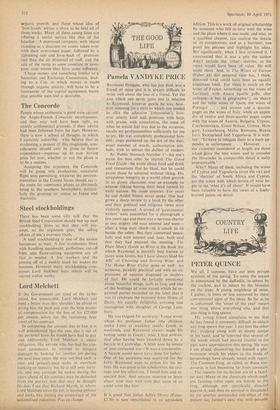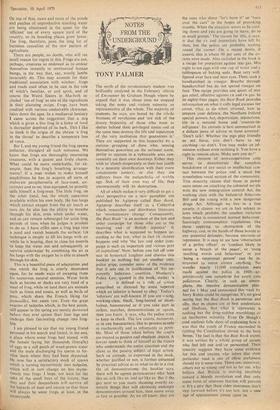COUNTRY LI FE PETER QUINCE .
We all, I suppose, have our own private symbols of the spring. To some the season is announced by the daffodils, to others by the cuckoo, and to others by the blossom on the trees. A young neighbour of mine, I gather, is: more or less unmoved by these conventional signs of the times. So far as he is concerned, the 'sweet of the year' means one thing above everything else, and that one thing is frog spawn.
My young friend complains to me that he has found it extremely difficult to obtain any frog spawn this year. I met him the other day, trudging along with an empty jamjar in his hand, and he reported that several of the ponds which had proved fruitful in the past were unproductive this spring. He was, I am afraid, discovering for himself a phe- nomenon which his elders in the study of herpetology have already noted with regret. The Common Frog, so called, or Rana tem- poraria, is fast becoming far from common.
The reasons for its decline are of a famil- iar sort. Many of the chemicals which mod- ern farming relies upon are hostile to the frog, although not specifically directed against it, and thus its survival is threatened by yet another unintended side-effect of the present-day farmer's easy way with poisons.
On top of that, more and more of the ponds and patches of unproductive standing water are being eliminated in the quest fot the 'efficient' use of every square yard of the country, so its breeding places grow fewer. The frog, therefore, joins the long list of harmless casualties of the new pattern of agriculture. There are people, no doubt, who will see small reason for regret in this. Frogs are not, perhaps, creatures so endowed as to endear themselves instantly to sentimental human beings, in the way that, say, woolly lambs invariably do. This may account for their traditional association with witches: frogs and toads used often to be cast in the role of witch's familiar, or evil spirit, and of course the Weird Sisters in Macbeth in- cluded toe of frog' as one of the ingredients in their alarming recipe. Frogs have been credited with various undesirable character- istics down the ages. In a mediaeval bestiary I came across the suggestion that a dog which is given a live frog in a lump of food is thereafter deprived of 'its bark. This I like to think is the origin of the phrase 'a frog in the throat' to describe a temporary loss of voice. But I, and my young friend the frog spawn collector, disregard all such nonsense. We know that frogs are thoroughly interesting creatures, with a quaint and Lively charm. What could be more remarkable, for ex- ample, than the frog's breathing arrange- ments? If a man wishes to make himself amphibious he has to acquire all sorts of elaborate paraphernalia of face-mask. alr- cy Under and so on; thus equipped, he proudly calls himself a frog-man. The little frog, on the other hand, has the whole apparatus available within his own body. He has lungs which extract oxygen from the air much as ours do; he also has the ability to breathe through his skin, even when under water, and so can remain submerged for quite long periods of time when he judges it prudent to do so. I have often seen a frog leap into a pond and vanish beneath the surface; his technique is simply to fill his lungs with air while he is leaping, then.to close his nostrils to keep the water out and subsequently to survive underwater by combining the air in his lungs with the oxygen he is able to absorb through his skin. This is a beautiful piece of adaptation. and one which the frog is utterly dependent Upon, for he needs ways of escaping from his numerous natural enemies. Water birds such as herons or ducks are very fond of a meal of frog, while on land there are animals such as foxes and stoats, as well as birds of Prey, which share the French liking for grenouilles, but eaten raw. Even the great swarms of tadpoles which, in the best ponds, still appear in the spring are mostly devoured before they ever sprout their four legs and undergo their fascinating change into frog- lets. • I am pleased to say that my young friend Persisted in his search and found, in the end, a place where some frogs had mated, with the female laying her thousands (literally) of eggs in a still patch of weed-grown water and the male discharging his sperm to fer- tilise them where they had been, deposited. He now has a satisfactory stock of spawn which is turning mysteriously into tadpoles, which will in turn change no less myste- riously into frogs. I hope, not least for the sake of the small boys of the future, that they and their descendants will survive all the hazards of man and nature so that there will always be some frogs, at least, in the Countryside.











































 Previous page
Previous page